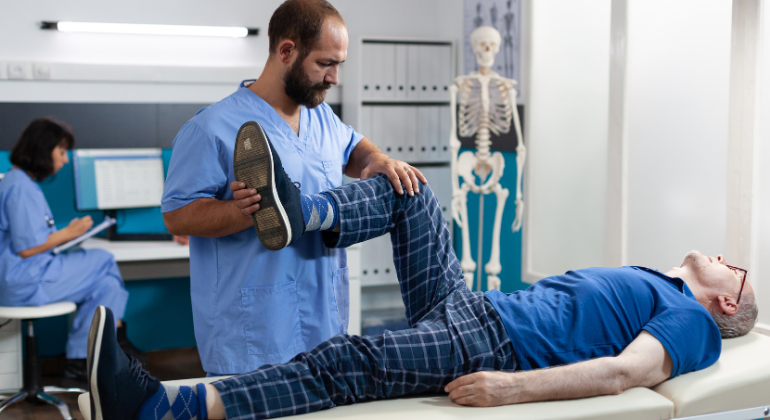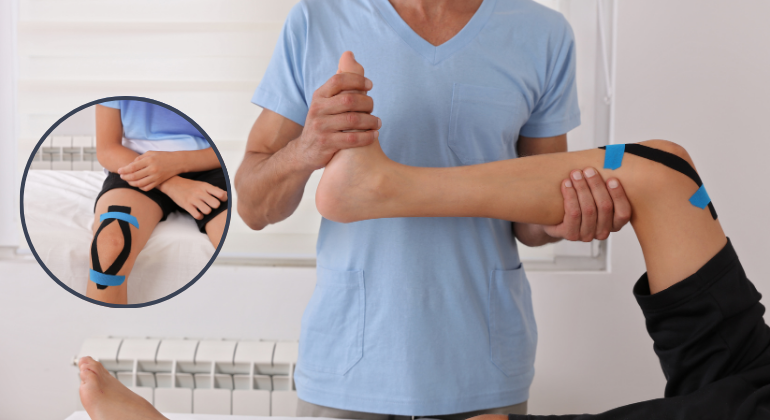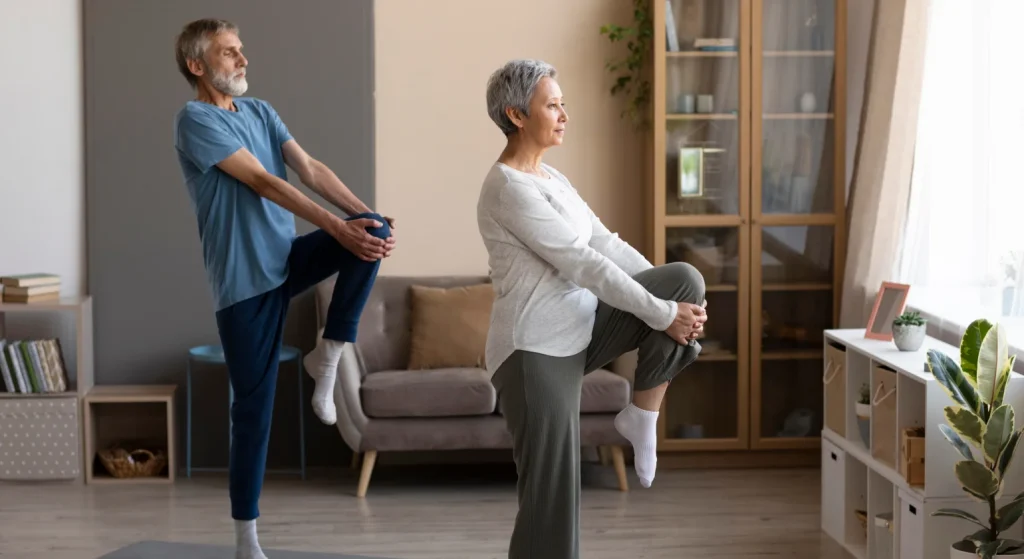Knee pain is a common and widespread issue that affects individuals of all ages, from children to seniors. It is often caused by factors such as injuries, overuse, or chronic conditions like arthritis. This pain can range from mild discomfort, such as a slight sprain, to severe and debilitating injuries, like torn ligaments or fractures, that significantly disrupt daily activities, mobility, and overall quality of life. In some cases, knee pain results from repetitive strain due to physical activities, while in others, it may stem from degenerative joint conditions. Regardless of the cause, knee pain can interfere with walking, running, climbing stairs, or even performing simple tasks, highlighting the importance of timely intervention and treatment.
Understanding the average knee pain recovery time is essential for setting realistic expectations and ensuring proper care. Recovery durations can vary significantly depending on the severity of the injury, the type of treatment administered, and individual factors such as age, overall health, and adherence to rehabilitation programs. For minor injuries like sprains, recovery might take just a few days to weeks, while severe issues like ligament tears or knee surgery may require several months to heal completely. By gaining insight into common knee injuries, recognizing factors that affect healing, and adopting proven strategies such as physiotherapy, strengthening exercises, and proper rest, you can actively support your recovery process. Taking these steps not only helps you return to your normal activities faster but also reduces the risk of long-term complications, promoting a healthier, pain-free lifestyle.
Knee Pain Recovery Time: How Long Does It Take to Heal?
The time it takes for knee pain to recover can vary widely based on the type and extent of the injury. Below are some general recovery timelines for common knee issues:
1. Minor Sprains and Strains
- Recovery Duration: 1–3 weeks with proper care.
- What to Do: Rest, ice, compression, and elevation (RICE) are effective for mild injuries. Gentle stretching and strengthening exercises can help speed up recovery.
2. Moderate Ligament Injuries
- Recovery Duration: 4–12 weeks.
- What to Do: Physiotherapy plays a critical role in restoring strength and mobility. Avoid high-impact activities until fully healed.
3. Severe Knee Injuries (Torn Ligaments or Meniscus Tears)
- Recovery Duration: 3–6 months, or longer if surgery is required.
- What to Do: Surgery may be necessary for severe tears, followed by extensive physiotherapy for full recovery.
Note: Consulting a healthcare professional is essential to determine the exact timeline for your condition.
Recovery Duration for Common Knee Injuries: What to Expect

Different types of knee injuries have unique recovery periods. Let’s take a closer look:
1. Recovery Time for Sprained Knees
Sprains occur when the ligaments around the knee are overstretched or torn.
- Grade 1 Sprain (Mild): Recovery takes about 1–2 weeks with rest and gentle exercises.
- Grade 2 Sprain (Moderate): Expect 3–6 weeks for recovery, often requiring physiotherapy.
- Grade 3 Sprain (Severe): Can take 8–12 weeks, and in some cases, surgery may be needed.
Tips for Healing:
- Follow the RICE method for immediate care.
- Gradually reintroduce weight-bearing activities under a physiotherapist’s guidance.
2. Time to Heal a Sprained Knee
Sprained knees can take anywhere from a few weeks to several months, depending on the severity.
Key Factors Affecting Recovery Time:
- Severity of the Sprain: More severe sprains require longer healing periods.
- Rehabilitation Efforts: Adhering to a physiotherapy plan can speed up recovery.
- Age and Overall Health: Younger, healthier individuals tend to heal faster.
What You Can Do:
- Wear a knee brace for support during the healing process.
- Engage in low-impact exercises like swimming or cycling to maintain mobility.
How Long Does It Take to Recover from Knee Pain After a Fall?
Knee pain after a fall is often caused by bruising, swelling, or minor ligament damage.
Recovery Timeline:
- Minor Injuries: Pain and swelling typically subside within 1–2 weeks.
- Moderate Injuries: Recovery may take 3–6 weeks with proper care and rest.
- Severe Injuries: If the fall caused a fracture or significant ligament damage, recovery could take 3–6 months.
Signs You Need Medical Attention:
- Persistent swelling or bruising beyond two weeks.
- Inability to bear weight on the knee.
- Sharp, localized pain that doesn’t improve.
Self-Care Tips:
- Use ice packs to reduce swelling during the first 48 hours.
- Elevate your leg to minimize fluid buildup.
- Perform gentle stretches to maintain flexibility as the pain subsides.
How Long Does It Take to Recover from Torn Knee Ligament Injuries?
Torn ligaments, such as the ACL (anterior cruciate ligament) or MCL (medial collateral ligament), are among the most serious knee injuries and often require extended recovery periods.
ACL Tears:
- Non-Surgical Recovery: 3–6 months with physiotherapy.
- Post-Surgery Recovery: 6–12 months, depending on the individual.
MCL Tears:
- Mild to Moderate Tears: 6–8 weeks with rest and rehabilitation.
- Severe Tears: 3–6 months if surgery is needed.
Tips for Recovery:
- Follow your physiotherapist’s recommendations for strengthening exercises.
- Avoid activities that put excessive strain on the knee, such as running or jumping.
- Use crutches or a knee brace to protect the joint during recovery.
Key Factors That Affect Knee Pain Recovery Time
The following factors can impact how quickly your knee pain resolves:
- Severity of the Injury: Minor injuries heal faster than severe ligament tears or fractures.
- Age and Health: Younger individuals with good overall health tend to recover more quickly.
- Adherence to Treatment: Consistently following physiotherapy and medical advice speeds up recovery.
- Activity Levels: Gradual reintroduction of physical activity helps avoid setbacks.
- Underlying Conditions: Issues like arthritis or previous injuries can prolong recovery.
Effective Tips to Speed Up Knee Pain Recovery

While recovery time varies, these tips can help accelerate the healing process:
- Commit to Physiotherapy:
- Physiotherapy is essential for rebuilding strength and mobility.
- Exercises tailored to your specific injury ensure optimal recovery.
- Practice Low-Impact Activities:
- Engage in swimming, walking, or cycling to maintain joint mobility without adding stress.
- Stay Consistent with Rest and Ice Therapy:
- Rest allows the injured tissues to heal, while ice reduces swelling and pain.
- Maintain a Balanced Diet:
- Foods rich in vitamins and protein promote tissue repair.
Final Thoughts on Knee Pain Recovery
Understanding knee pain recovery time is crucial for setting realistic expectations and ensuring a smooth healing process. Whether you’re dealing with a sprained knee, recovering from a fall, or healing from a torn ligament, proper care and physiotherapy can make a significant difference.
If your pain persists or worsens, consult a healthcare professional for a tailored recovery plan. At Painflame, we specialize in physiotherapy for knee injuries, offering personalized programs to help you recover faster and stronger.
Contact Painflame today to take the first step toward pain-free mobility!
Recent Blog : Top Foods to Speed Up Recovery from Knee Injuries
Frequently Asked Questions (FAQs)
1. Can exercise delay knee pain recovery?
Exercise can slow recovery if done improperly or too soon. High-impact activities or overexertion can strain the knee further. However, low-impact exercises like swimming or cycling, guided by a physiotherapist, can promote healing and strengthen the joint.
2. Does wearing a knee brace help speed up recovery?
Yes, a knee brace can provide additional support and stability during recovery. It reduces strain on the joint and prevents further injury, especially for ligament or sprain-related knee pain. Always consult a professional for the right type of brace.
3. How do weather changes affect knee pain recovery?
Weather changes, especially cold or damp conditions, can increase stiffness and discomfort in the knee. To minimize the impact, keep the joint warm, stay active indoors, and perform regular stretching exercises to maintain flexibility.
4. Should I avoid climbing stairs during knee pain recovery?
Climbing stairs can put extra pressure on your knees. Avoid it in the early stages of recovery, especially if you have ligament injuries or severe pain. As healing progresses, you can gradually reintroduce it under guidance from a physiotherapist.
5. Can knee pain return after recovery?
Yes, knee pain can return if the underlying cause isn’t fully addressed or if proper rehabilitation isn’t completed. Strengthening exercises, maintaining a healthy weight, and avoiding repetitive strain can reduce the risk of recurrence.






